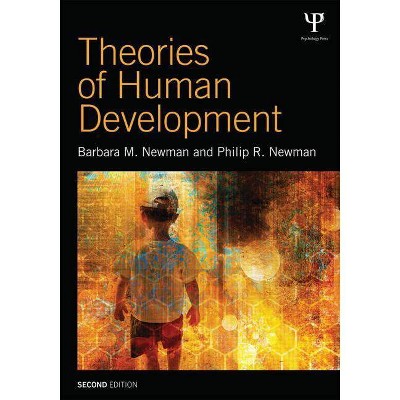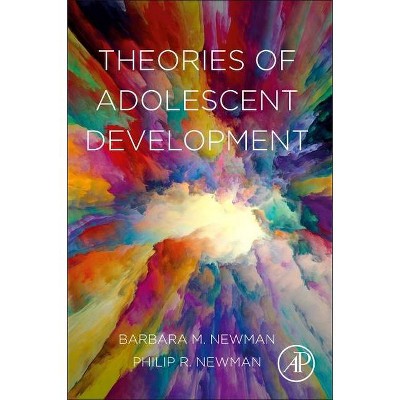Theories of Human Development - 2nd Edition by Barbara M Newman & Philip R Newman (Paperback)

Similar Products
Products of same category from the store
AllProduct info
<p/><br></br><p><b> About the Book </b></p></br></br><p>This uniquely organized text introduces ten key human development theories that continue to guide research and practice.</p><p/><br></br><p><b> Book Synopsis </b></p></br></br><p>Key human development theories that continue to guide research and practice are examined in this engaging text. Ten key theories are grouped into three families - those that emphasize biological systems, environmental factors, and those that reflect an interaction between the two. This organization enhances students' ability to evaluate, compare, and contrast theories both within and across families. Each family is introduced with an overview of their unique perspectives and the rationale for grouping them together. Discussion of each theory includes the cultural/historical context during the theory's development, its key concepts and ideas, extensions of the theory in contemporary work, an example showing a modification of the theory, an application of how the theory is used to inform practice, and an analysis of how the theory answers 6 basic questions that a human development theory should address. Each chapter includes an overview of the strengths and weaknesses of the theories to facilitate comparisons. Theories that have a clear lifespan focus along with cases and examples that address issues across the lifespan are included</p> <p></p><b> <p>The second edition features: </p></b> <p>-A new chapter on bioecological theory that highlights the increased use of this theory in the development of family, school, and community intervention programs.</p> <p>-A new epilogue that examines the same case via each of the ten theories illustrating their similarities and differences and how these ideas cast a unique light on a common situation.</p> <p>-New <i>opening cases</i> that bring theory to life along with narrative that links the case to the chapter's concepts, <i>guiding questions</i> that help students compare theoretical perspectives, <i>critical thinking questions</i> that focus on using the theory to interpret the case and personal life experiences, and recommended resources that extend students' understanding. </p> <p>-More examples from various disciplines that address topics students are likely to encounter as professionals. </p> <p>-A new glossary that defines the boldfaced key terms. </p> <p>-Enhanced website at www.psypress.com/9781848726673 that provides <i>instructors</i> with a test bank, Power points, discussion questions and activities, additional cases with questions, teaching notes for using the book with various types of majors, and a conversion guide outlining changes to the new edition and <i>students with</i> key terms with hot links to their definitions, chapter summaries and outlines, and additional resources for further study.</p> <p>-Updated research and applications highlight the latest scientific developments.</p> <p></p> <p>Ideal for advanced undergraduate or beginning graduate courses in theories of development, lifespan or child development taught in psychology, human development, family studies, education, and social work.<p/><br></br><p><b> Review Quotes </b></p></br></br><br><p><em>This is an essential text for courses on psychological theories of human development. The book is organized to maximize students' understanding of their contributions, cultural and historical contexts, and similarities and differences. Complex ideas are presented clearly, comprehensively, and accessibly, as brought to life through the use of case studies and guiding questions. </em><b><em>-</em> Judith G. Smetana, University of Rochester, USA</b></p><p>This text offers a clear view on lifespan development and would be an excellent resource for human development and developmental psychology courses. The case vignettes, guiding questions, and critical thinking exercises facilitate a deep understanding of developmental theories and related real-world applications. -<strong>Katharine Ann Buck, University of Saint Joseph, USA</strong></p><p><em>In an era when advancements in statistical analyses have been emphasized to the detriment of conceptual richness, Newman & Newman have masterfully written an engaging book that stimulates critical thinking and applied foci, establishing theoretical understanding as the foundation for research and practice.</em><b><em> - </em>Rob Palkovitz, University of Delaware, USA</b></p><p>This edition is every bit as good as the first -- it fosters critical thinking by explaining how and why different theories of development provide distinctive routes for understanding the field, and how they frame research. The book draws all these theories together by keeping in view the biological, psychological and societal levels of analysis. It is ideal for upper level undergraduates and graduate students who really want a strong grasp of the field of human development. <b>- Dominic Abrams, University of Kent, UK</b></p><p>The book is written at an optimal level for comprehension. ... I felt as if I could open the book to any page, start reading and understand what the author was trying to communicate. ... I already use the Newman & Newman text for my Human Development ... graduate level course. ...I would seriously consider adopting it because ... the students like it. <b>- Davidio Dupree, University of Pennsylvania, USA</b></p><p><i>Students often comment that the book is very clear and not intimidating. ...The array of theories covered ... is a strength compared to competing titles. ... Newman ... does a better job at bringing the theories up-to-date. ... I will likely be switching back to ... Newman ... due to the inclusion of the bioecological chapter</i>. - <b>Hillary Fouts, University of Tennessee-Knoxville, USA</b></p><p><em>I</em> <i>would seriously consider [Newman] for adoption. ... [It is] current, well-written and organized, and serves as a solid introduction to developmental theories. ..</i>.<i> I appreciate the lifespan approach. ...The authors do a very nice job of providing clear applications of each theory.</i> - <b>Michele Gregoire Gill, University of Central Florida, USA</b></p><p><em>The theories were presented in a straightforward, easy to read, and understandable manner. ... Content, writing style, clarity, accuracy and timeliness were excellent. The basic terms and concepts were well defined. ... I would consider replacing [our current] ... text [with Newman]</em>. - <b>Lydia B. Smith, University of North Carolina - Charlotte, USA</b></p><p>The figures ... [that] show the relationships across theories will be very helpful for the visual learner. ...The questions to guide the reader at the beginning of the chapter are excellent. Also, including the key words, further research, and discussion questions are excellent additions. - <b>Hillary Merk, University of Portland, USA</b></p><br><p/><br></br><p><b> About the Author </b></p></br></br><p><strong>Barbara M. Newman </strong>is a professor emeritus at the University of Rhode Island in Human Development and Family Studies. </p><b> <p>Philip R. Newman</b> is a Fellow of the America Psychological Association, SPSSI, and the American Orthopsychiatric Association. </p>
Price History
Cheapest price in the interval: 120 on October 28, 2021
Most expensive price in the interval: 120 on February 4, 2022
Price Archive shows prices from various stores, lets you see history and find the cheapest. There is no actual sale on the website. For all support, inquiry and suggestion messagescommunication@pricearchive.us




















